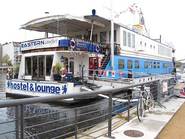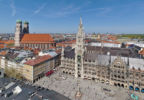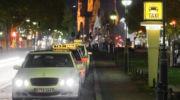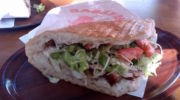Once you've decided when and where you want to go, you'll begin to make travel arrangements. You will no doubt receive a lot of advice about clothes (keys: a layered, easy-to-maintain wardrobe and sensible walking shoes), how to pack and how much money to take.
Before You Go: Learn The Language

Great. Now what?
Part of the fun for me is learning as much as I can about the places I'm going to visit—the culture, the language, the terrain, the history.
The travel section of your library can offer good background material on these subjects. Bookstores have lots of how-to travel books. Many books in my own library came from garage and rummage sales. Additional help came from stacks of old discarded National Geographics, with their valuable maps and articles about various trip itinerary destinations. I've framed some of these maps and have put many articles in file folders for future reference.
As for learning the language, it helps if you have a natural talent in that direction. I don't. In fact, before my first trip to Germany, I took an adult education course in conversational German. Shortly thereafter, I became a drop-out.
Language Hope
One thing that offered me hope was a paperback book devoted to the goal of teaching its readers German in 10 minutes a day. It was a good guide to pronunciation and sentence structure. It also offered many basic everyday facts, and provided enough vocabulary to get along. It included vocabulary flash cards and gummed labels to attach to household articles. (In fact, remnants of these stickers are still visible on some pieces of my furniture.)
As it turned out, when I got to Germany I didn't really need to speak German. Most of the friends I visited were able to converse in excellent English, and were happy to try out their English on me. In stores and restaurants, too, English worked just fine. My advance study was helpful, however, for reading German. I learned to take those long compound words apart. This technique allowed me to get the general idea when it came to reading newspapers and deciphering programs.
Prior to my two trips to Russia, a 10-minutes-a-day book gave me help in deciphering the Cyrillic alphabet, at least enough to enable me to translate some titles of artworks in museums and to read road and building signs. (I didn’t try to speak Russian.) Afterwards, when I gave talks to school children, students had fun trying to write their names in Russian using my alphabet posters.
Language as a Tool
Even if you don't succeed in learning the languages of the countries you'll be visiting, allow yourself to listen to and absorb the beauty and rhythm of the words you hear. And consider buying a vocabulary book, either before you go or when you get there. You'll get so much more out of what you're experiencing if you do.
Why did you decide to take this overseas trip? Certainly to learn what a wonderful world this is, and to appreciate its dimensions more deeply. Even a little bit of language study can facilitate this goal.













